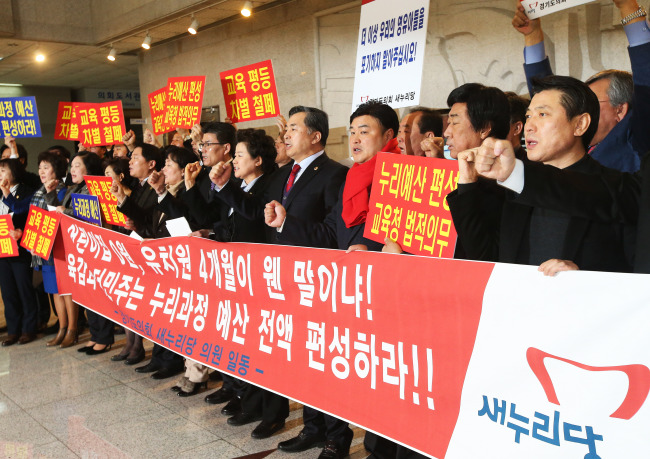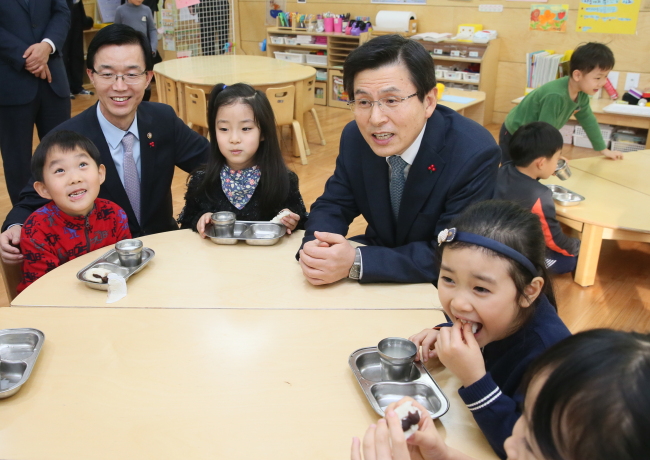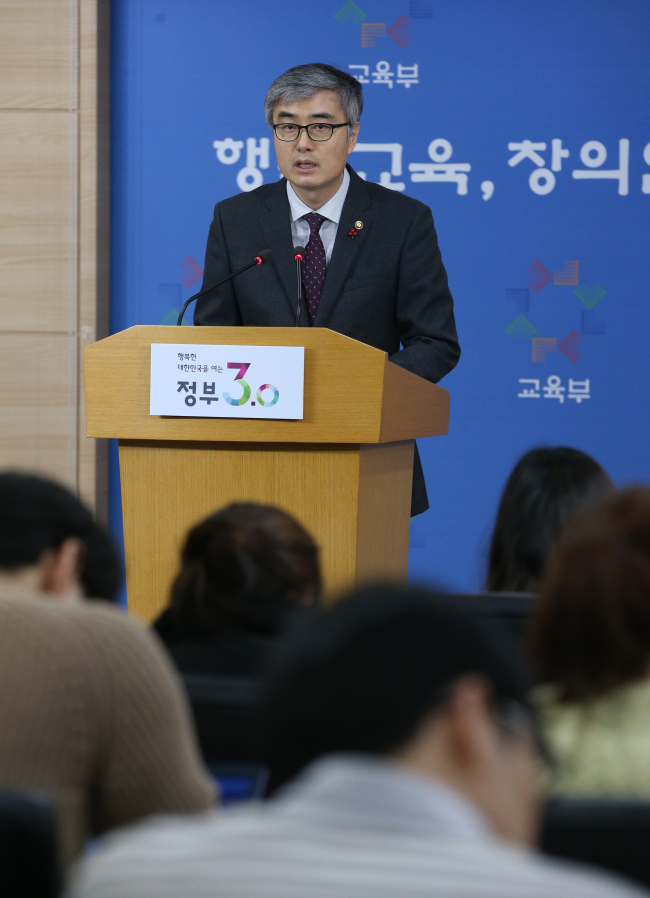The year 2016 is expected to be a boisterous one in the education sector, especially as government policies continue to fuel political and ideological debates about issues including free child care, history textbook publication and college reform.
Last week, Seoul’s education superintendent Cho Hi-yeon suggested the government raise the budget for local education offices to 21.27 percent of the overall tax income, up from the current 20.27 percent, saying that this would allow them to better shoulder the costs of the state-led free child care program.
The suggestion marked a step back from Cho and other superintendent’s initial position of asking for a 5 percent increase. However, it was still met with a resounding “no” from the Education Ministry who reiterated that it was the local offices’ legal responsibility to fund the “Nuri” program.
The ongoing tug-of-war over the Nuri program is just one issue in a spate of education-related controversies.
Nuri situation at a standstill
Two meetings held last month between new Education Minister Lee Jun-sik and the heads of 17 education offices across the country yielded no meaningful results, as the two sides fervently refused to back down.
As of Monday, Seoul, Gwangju, Incheon, Gyeonggi Province, Gangwon Province, South and North Jeolla Provinces, have refused to fully allocate budgets for the Nuri program.
 |
| Saenuri Party members of the Gyeonggi provincial assembly on Thursday demand the provincial government to allocate budgets for the free childcare “Nuri” program in Suwon, Gyeonggi Province. / Yonhap |
The contentious point of the Nuri program, which subsidizes kindergarten and day care center fees for children aged 3 to 5, is the ambiguous nature of the related law. Korean law states that education offices are to support “education institutes,” which has generally been interpreted as facilities under supervision of the Education Ministry.
The original version of the program launched in 2012 under the Lee Myung-bak administration targeted children aged 5 — a year before they start school — and mainly subsidized kindergarten fees.
But the Park Geun-hye administration expanded the age group and local education offices began to refuse to pay for day care centers, which are under the purview of the Welfare Ministry.
“The government plan to unify child care and child education is an important step, and I believe it is toward an ideal path,” said Cho Hi-yeon. He added, however, that it was impossible for education offices to fully subsidize the program due to financial limitations.
The government pointed out that this year’s budget for education offices had increased by 1.8 trillion won to 41.2 trillion, and claimed that this would allow education offices to sufficiently cover the 4 trillion won cost of the program within their budgets. But the education offices said the increase was barely enough to cover the rise in employment costs and inflation.
Although the government allocated 300 billion won extra for the Nuri program, education offices say this is not enough.
In a 2014 report, the state-run Korea Educational Development Institute said that the central government should provide for the Nuri program as no additional budget has been given specifically by the Education Ministry for it. According to the education offices, their accumulated debt stands at 7.89 trillion won, more than one-third of their total budget.
Vice Education Minister Lee Young said that as the number of students are decreasing, authorities need to take a cautious approach toward raising the budget. But the Seoul education office countered by saying that the ideal approach should be to provide higher quality education to fewer students with an increased budget, rather than reducing the funding as student numbers drop.
The two sides dug their heels deeper as they engaged in a debate of who gave in first to increasing public demand to get the Nuri program back on its feet.
 |
| Prime Minister Hwang Kyo-ahn on Thursday visit a kindergarten in Jongno-gu, central Seoul. / Yonhap |
Finance Minister Yoo Il-ho on Monday released a statement saying again that the responsibility of funding Nuri is on the education offices.
“We (the government) will provide the supplementary budget for offices which allocate budgets for Nuri … If they continue to refuse, we will fix the law to ensure that it is done,” he said.
The association of education superintendents said Monday that they will hold an emergency meeting on Wednesday to discuss countermeasures.
College reform off to a shaky start
Last month, the Education Ministry unveiled its plans for this year. Headlining the blueprint was its kickoff of the Program for Industry Needs-Matched Education, or PRIME project.
The project, which is currently the largest government subsidy program for higher education institutions, will pump 600 billion won overall in financial support over the next three years for 19 universities to conduct reforms to expand the number of students in disciplines that are in high demand based on research.
While the project says “industry needs,” in reality the project is moving in the direction of expanding departments related to engineering or medicine while downsizing humanities-related fields.
A December report by the Labor Ministry forecast that the job mismatch will worsen over the next 10 years, with majors in social sciences, education and humanities from four-year universities exceeding demand by 438,000. But the report showed the engineering majors and medical students from universities would be in short supply by 255,000.
The Education Ministry said that it would increase the number of students studying disciplines in short supply — including engineering — by 20,000 before 2020, while reducing the quota of those in excessive supply. Its plan did not include one to expand medical departments as this would require a sign off from the Welfare Ministry.
“With the PRIME project, I will reinforce fields of study that are in high demand in the job market, hen solving the problem of job mismatch,” said Minister Lee at the meeting with heads of college presidents on Wednesday.
He also emphasized the state-led college reform plans, which mandate colleges and universities to downsize by 160,000 in terms of student numbers by 2022. While the law mandating students to follow government reform is still pending in the National Assembly, the ministry can still cut subsidies for institutes that refuse to comply.
Although neither the PRIME reforms nor the college downsizing are mandatory at the moment, universities say that government funding is crucial in their operations, particularly with the ministry restricting schools from raising tuition fees in line with the president’s “half-priced tuition” pledge.
 |
| Vice Education Minister Lee Young / Yonhap |
The education minister told local media on Wednesday that he planned continue of keeping college tuition as low as possible.
The Government’s emphasis on the PRIME project has had ripple effects. Konkuk University announced last month that it was merging departments to “improve competitiveness and to vitalize industry-linked education opportunities such as the PRIME project.”
Dance majors from Busan-based Silla University on Monday denounced the school’s decision to shut down the dance department in order to conduct reforms for the PRIME project.
Student bodies of nine universities in Seoul and Gyeonggi Province — including Seoul National University, Kyung Hee University and Ewha Womans University — jointly held a protest last month to denounce the project.
“The Education Ministry is trying to pin the blame of youth unemployment on colleges and students. But we students are the ones being penalized by their misguided education policies,” they said. “Higher education institutes that have continued for decades face the threat of being restructured in just months for the sake of employment rates.”
‘Secrecy’ accusations on history textbook
On Wednesday, Vice Education Minister Lee Young said that the authoring process for new history textbooks has already begun, without its authors or criteria being revealed to the public. These books are slated to be used in secondary education from next year’s academic year.
“There had been requests to reveal the criteria, but we felt that not disclosing (the criteria) would be better for maintaining a stable environment for the authors,” he said.
Lee said that both would be disclosed eventually, although he refused to specify when.
The authorities’ refusal to reveal the authoring criteria to the public has revived the month-long debate about the ministry’s secrecy over the government-issued history textbook.
The Park administration, after declaring the current privately-published books biased toward left-wing ideas and North Korea, announced last October it will take over the publishing rights. But there has been a nationwide dispute over whether the conservative president may attempt to whitewash controversial political figures, including her father, former President Park Chung-hee.
In an attempt to address the public concern, then-Education Minister Hwang Woo-yea vowed to keep the publication process transparent.
Despite Hwang’s pledge, the ministry has only revealed two of its 47 authors. One of them, Professor Emeritus Choi Mong-lyong from Seoul National University, resigned over a sexual harassment scandal.
By Yoon Min-sik (minsikyoon@heraldcorp.com)

